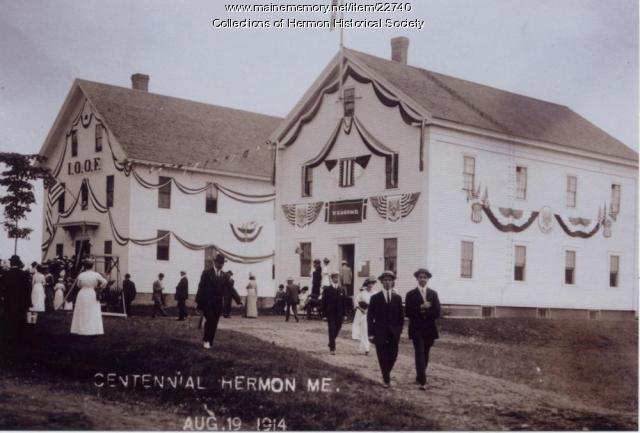Keywords: Political support
- Historical Items (228)
- Tax Records (0)
- Architecture & Landscape (1)
- Online Exhibits (60)
- Site Pages (46)
- My Maine Stories (10)
- Lesson Plans (10)
Lesson Plans
Your results include these lesson plans. Your results include these lesson plans.
Lesson Plan
Grade Level: 9-12
Content Area: Social Studies
Maine's quest for statehood began in the years immediately following the American Revolution. Though the state of Massachusetts consented to the separation in 1819 and Maine would ultimately achieve statehood in 1820, Maine’s split from Massachusetts was not without controversy and was not universally supported by people living in Maine. Using primary sources, students will explore the arguments for and against Maine statehood. Students will gather evidence and arguments to debate the statement: It is in the best interests of the people of Maine for Maine to become its own state.
Lesson Plan
Becoming Maine: The Votes for Statehood
Grade Level: 3-5
Content Area: Social Studies
Maine became a state in 1820 after separating from Massachusetts, but the call for statehood had begun long before the final vote. Why did it take so long? Was 1820 the right time? In this lesson, students will begin to place where Maine’s statehood fits into the broader narrative of 18th and 19th century American political history. They will have the opportunity to cast their own Missouri Compromise vote after learning about Maine’s long road to statehood.
Lesson Plan
Primary Sources: Daily Life in 1820
Grade Level: 6-8, 9-12
Content Area: Social Studies
This lesson plan will give students the opportunity to explore and analyze primary source documents from the years before, during, and immediately after Maine became the 23rd state in the Union. Through close looking at documents, objects, and art from Maine during and around 1820, students will ask questions and draw informed conclusions about life at the time of statehood.
Lesson Plan
Maine Statehood and the Missouri Compromise
Grade Level: 9-12
Content Area: Social Studies
Using primary sources, students will explore the arguments for and against Maine statehood and the Missouri Compromise, and the far-reaching implications of Maine statehood and the Missouri Compromise such as the preservation and spread of slavery in the United States. Students will gather evidence and arguments to debate the statement: The Missouri Compromise was deeply flawed and ultimately did more harm to the Union than good.
Lesson Plan
Primary Sources: Maine Women's Causes and Influence before 1920
Grade Level: 6-8
Content Area: Social Studies
This lesson plan will give students the opportunity to read and analyze letters, literature, and other primary documents and articles of material culture from the MHS collections relating to the women of Maine between the end of the Revolutionary War through the national vote for women’s suffrage in 1920. Students will discuss issues including war relief (Civil War and World War I), suffrage, abolition, and temperance, and how the women of Maine mobilized for or in some cases helped to lead these movements.
Lesson Plan
Becoming Maine: The District of Maine's Coastal Economy
Grade Level: 3-5
Content Area: Social Studies
This lesson plan will introduce students to the maritime economy of Maine prior to statehood and to the Coasting Law that impacted the separation debate. Students will examine primary documents, take part in an activity that will put the Coasting Law in the context of late 18th century – early 19th century New England, and learn about how the Embargo Act of 1807 affected Maine in the decades leading to statehood.
Lesson Plan
Immigration: Challenges and Opportunities in Maine
Grade Level: 9-12
Content Area: Social Studies
Learn about immigration in the United States using primary sources from Maine Memory Network and the Library of Congress.
Lesson Plan
Nation to Nation: Treaties and Legislation between the Wabanaki Nations and the State of Maine
Grade Level: 9-12
Content Area: Social Studies
This lesson plan asks high school students to think critically about and look closely at documentation regarding the Nation-to-Nation relationship between the Wabanaki Tribes/Nations and the State of Maine. This lesson asks students to participate in discussions about morality and legislative actions over time. Students will gain experience examining and responding to primary and secondary sources by taking a close look at documents relating to the Maine Indian Claims Settlement Act of 1980 (MICSA) and the issues that preceded and have followed the Act.
Lesson Plan
Building Community/Community Buildings
Grade Level: 6-8
Content Area: Social Studies
Where do people gather? What defines a community? What buildings allow people to congregate to celebrate, learn, debate, vote, and take part in all manner of community activities? Students will evaluate images and primary documents from throughout Maine’s history, and look at some of Maine’s earliest gathering spaces and organizations, and how many communities established themselves around certain types of buildings. Students will make connections between the community buildings of the past and the ways we express identity and create communities today.
Lesson Plan
Maine's Acadian Community: "Evangeline," Le Grand Dérangement, and Cultural Survival
Grade Level: 9-12
Content Area: English Language Arts, Social Studies
This lesson plan will introduce students to the history of the forced expulsion of thousands of people from Acadia, the Romantic look back at the tragedy in Henry Wadsworth Longfellow's famous epic poem Evangeline and the heroine's adoption as an Acadian cultural figure, and Maine's Acadian community today, along with their relations with Acadian New Brunswick and Nova Scotia residents and others in the Acadian Diaspora. Students will read and discuss primary documents, compare and contrast Le Grand Dérangement to other forced expulsions in Maine history and discuss the significance of cultural survival amidst hardships brought on by treaties, wars, and legislation.











